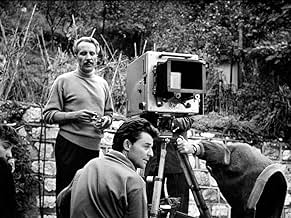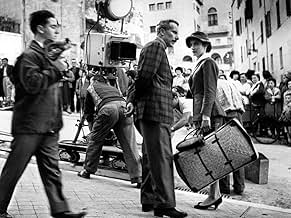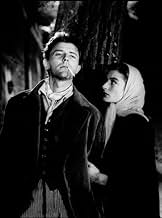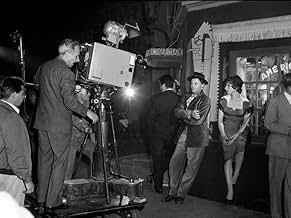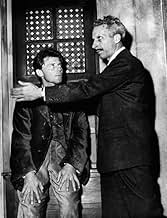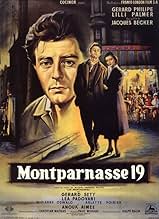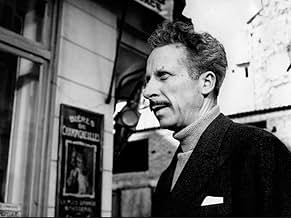ÉVALUATION IMDb
7,3/10
1,8 k
MA NOTE
Ajouter une intrigue dans votre langueChronicling the last year of the life of Modigliani, an Italian painter living in abject poverty in Paris who falls in love with Jeanne, a girl from a wealthy family whose parents do not app... Tout lireChronicling the last year of the life of Modigliani, an Italian painter living in abject poverty in Paris who falls in love with Jeanne, a girl from a wealthy family whose parents do not approve of him.Chronicling the last year of the life of Modigliani, an Italian painter living in abject poverty in Paris who falls in love with Jeanne, a girl from a wealthy family whose parents do not approve of him.
- Director
- Writers
- Stars
Pâquerette
- Madame Salomon - la concierge
- (as Madame Paquerette)
Carole Sands
- Madame Dickson
- (as C. de Rieux)
Antoine Tudal
- Cendrars
- (as A. Tudal)
Lea Padovani
- Rosalie
- (as Léa Padovani)
Avis en vedette
In 1919, the painter Amedeo Modigliani spent the last year of his life. He lived in abject poverty in the Parisian artists' quarter of Montparnasse. This is the story of the film by French director Jacques Becker (1906-1960), who created such masterpieces as TOUCHEZ PAS AU GRISBI (1954) and LE TROU (1960).
Modigliani (Gérard PHILIPE) is kept afloat by Anna Zbirowska (Lila KEDROVA / OSCAR 1965: ACADEMY AWARD for ALEXIS SORBAS) and her husband, and his gallerist Berthe Weill (Marianne OSWALD) also tries hard to find buyers for his paintings. But it's simply not enough. The handsome Modigliani also has to accept payment for his sexual services from the British writer Beatrice Hastings (Lilli PALMER / GOLDEN GLOBE 1960: nomination for BUT NOT FOR ME). The only bright spot in this messed-up situation is his tender love for the young Jeanne (Anouk AIMÉE / OSCAR 1967: nomination for UN HOMME ET UNE FEMME). But the path to self-inflicted ruin seems inevitable. Or could the interest of the art dealer Morel (very diabolical: Lino VENTURA) bring the longed-for salvation?
Jacques BECKER took on this commissioned directorial role as a replacement for his idolized Max OPHÜLS. Becker apparently got along well with the leading actor Gérard PHILIPE (1922-1959), but he apparently rejected his style of performance. Becker couldn't have prevented such a major French film star as Philippe from appearing, even though it completely contradicted his style of filmmaking. This is certainly evident in the film, but Becker has turned it into the eternal drama of a misunderstood artist (the complete opposite of Philippe), who can only be "recognized" by the audience after his death.
The wonderful Lilli Palmer (1914-1986) plays her small role superbly, as always. The lack of dubbing makes it possible to discover today what was cut from the film for West German audiences at the time. At the very beginning, the writer played by Palmer ends up in bed with the main character and is seen again after the act. Seeing the crowd-pleaser Palmer in such a compromising situation was probably too much for West German audiences to bear at the time. Bygone days!
Modigliani (Gérard PHILIPE) is kept afloat by Anna Zbirowska (Lila KEDROVA / OSCAR 1965: ACADEMY AWARD for ALEXIS SORBAS) and her husband, and his gallerist Berthe Weill (Marianne OSWALD) also tries hard to find buyers for his paintings. But it's simply not enough. The handsome Modigliani also has to accept payment for his sexual services from the British writer Beatrice Hastings (Lilli PALMER / GOLDEN GLOBE 1960: nomination for BUT NOT FOR ME). The only bright spot in this messed-up situation is his tender love for the young Jeanne (Anouk AIMÉE / OSCAR 1967: nomination for UN HOMME ET UNE FEMME). But the path to self-inflicted ruin seems inevitable. Or could the interest of the art dealer Morel (very diabolical: Lino VENTURA) bring the longed-for salvation?
Jacques BECKER took on this commissioned directorial role as a replacement for his idolized Max OPHÜLS. Becker apparently got along well with the leading actor Gérard PHILIPE (1922-1959), but he apparently rejected his style of performance. Becker couldn't have prevented such a major French film star as Philippe from appearing, even though it completely contradicted his style of filmmaking. This is certainly evident in the film, but Becker has turned it into the eternal drama of a misunderstood artist (the complete opposite of Philippe), who can only be "recognized" by the audience after his death.
The wonderful Lilli Palmer (1914-1986) plays her small role superbly, as always. The lack of dubbing makes it possible to discover today what was cut from the film for West German audiences at the time. At the very beginning, the writer played by Palmer ends up in bed with the main character and is seen again after the act. Seeing the crowd-pleaser Palmer in such a compromising situation was probably too much for West German audiences to bear at the time. Bygone days!
Every generation sees or thinks it sees things differently from previous generations; this film shows yet again that bohemian boorishness and temperamental talent is and was nothing new. If you're seen to be an Artist also being a fascinating penniless perpetual drunk yob can be acceptable, that troubled spirit is sometimes the price of Genius. Amedeo Modigliani was an Italian artist who died at 36 of TB in France, the almost impossibly handsome Gerard Philipe who played him here died the year after the film also at 36 of cancer, and director Max Ophuls died before production started – it makes this French-Italian co-production especially poignant.
The story follows the last period of Modigliani's life about 1919, after he met and fell madly in love with fellow artist Jeanne Hebuterne, their trials, tribulations and tragedy. It's all done very well, definitely not as the elegant Ophuls would have done it (witness those clumsy tracking dancing scenes) with good black and white photography and great acting: basically no problems with any of it. However the end of the film was very different to the reality and bearing in mind it was fairly frank anyway I can't understand why the truth was jettisoned at the climax. Did Modigliani's daughter object? What actually happened was incredibly sad, brutal and even incomprehensible but still would have made more sense than the end to the film did. It turned a study in romance into a lesson in sordidness.
But never mind, it was still an interesting journey into an Artist's troubled mind and life and the joy and pain he brought to those around him. I wouldn't hang one of Modigliani's hideous paintings up in my house unless I was paid a lot to; I prefer the film – because Beauty is either in the eye of the beholder or the owner.
The story follows the last period of Modigliani's life about 1919, after he met and fell madly in love with fellow artist Jeanne Hebuterne, their trials, tribulations and tragedy. It's all done very well, definitely not as the elegant Ophuls would have done it (witness those clumsy tracking dancing scenes) with good black and white photography and great acting: basically no problems with any of it. However the end of the film was very different to the reality and bearing in mind it was fairly frank anyway I can't understand why the truth was jettisoned at the climax. Did Modigliani's daughter object? What actually happened was incredibly sad, brutal and even incomprehensible but still would have made more sense than the end to the film did. It turned a study in romance into a lesson in sordidness.
But never mind, it was still an interesting journey into an Artist's troubled mind and life and the joy and pain he brought to those around him. I wouldn't hang one of Modigliani's hideous paintings up in my house unless I was paid a lot to; I prefer the film – because Beauty is either in the eye of the beholder or the owner.
A few years ago it was hoped that Anouk Aimée would attend a screening of 'Lola' at the French Institute and afterwards answer audience questions. To my great disappointment and that of many others, Mlle Aimée failed to materialise.
I had been hoping to ask her just how much influence Modigliani's daughter Jeanne had on the making of 'Montparnasse 19' which covered the final year in her father's life.
She herself was two months old when he died at just thirty-five but her birth and her mother's suicide by defenestration are absent from the film.
The other mystery of course is how much of Henri Jeanson's original screenplay was changed or jettisoned when Jacques Becker took over the direction from an ailing Max Ophuls. By all accounts Jeanson was thoroughly displeased and took legal action.
What is certain of course is that cinematographer Christian Matras has shot this in the style of Becker and not of Ophuls. There are also scenes with which Ophuls would I'm sure have felt uncomfortable, not least that in which Beatrice Hastings asks Modigliani to hit her again after he has knocked her to the floor!
However ruthless, selfish or anti-social great painters might be they are invariably excused as their behaviour is considered part of the artistic temperament or the prerogative of genius.
Although Modigliani might not have been a jackpot of admirable character traits, the compromises of film dictate that his character be sympathetic. Gérard Philippe is ideal casting in this respect. Granted, the massive ego of the artist is there but also the despair and vulnerability.
It is a pity that the character of his common-law wife Jeanne Hébuterne is so thinly drawn here but Mlle Aimée does her best.
The two performances that stand out are those of Lilli Palmer who is magnificent as Beatrice and Lino Ventura as Morel, a morally vacuous art dealer who observes Modigliani's decline like a vulture circling a dying body.
As one would expect from Becker there is a wonderful sense of period and place and his direction is taut.
There are weaknesses to be sure but one accepts those in exchange for its strengths and the film has a special quality that is hard to define.
Becker was one of the select few that received approval from the Cahiers du Cinema/New Wave contingent.
Jean Luc Godard's appraisal is insightful: "Everything rings true in this totally false film. Everything is illuminated in this obscure film."
Ophuls died shortly before the film was released and within two years both Philippe and Becker had passed away. Ars longa. Vita brevis.
I had been hoping to ask her just how much influence Modigliani's daughter Jeanne had on the making of 'Montparnasse 19' which covered the final year in her father's life.
She herself was two months old when he died at just thirty-five but her birth and her mother's suicide by defenestration are absent from the film.
The other mystery of course is how much of Henri Jeanson's original screenplay was changed or jettisoned when Jacques Becker took over the direction from an ailing Max Ophuls. By all accounts Jeanson was thoroughly displeased and took legal action.
What is certain of course is that cinematographer Christian Matras has shot this in the style of Becker and not of Ophuls. There are also scenes with which Ophuls would I'm sure have felt uncomfortable, not least that in which Beatrice Hastings asks Modigliani to hit her again after he has knocked her to the floor!
However ruthless, selfish or anti-social great painters might be they are invariably excused as their behaviour is considered part of the artistic temperament or the prerogative of genius.
Although Modigliani might not have been a jackpot of admirable character traits, the compromises of film dictate that his character be sympathetic. Gérard Philippe is ideal casting in this respect. Granted, the massive ego of the artist is there but also the despair and vulnerability.
It is a pity that the character of his common-law wife Jeanne Hébuterne is so thinly drawn here but Mlle Aimée does her best.
The two performances that stand out are those of Lilli Palmer who is magnificent as Beatrice and Lino Ventura as Morel, a morally vacuous art dealer who observes Modigliani's decline like a vulture circling a dying body.
As one would expect from Becker there is a wonderful sense of period and place and his direction is taut.
There are weaknesses to be sure but one accepts those in exchange for its strengths and the film has a special quality that is hard to define.
Becker was one of the select few that received approval from the Cahiers du Cinema/New Wave contingent.
Jean Luc Godard's appraisal is insightful: "Everything rings true in this totally false film. Everything is illuminated in this obscure film."
Ophuls died shortly before the film was released and within two years both Philippe and Becker had passed away. Ars longa. Vita brevis.
Not particularly stunning but very effective and rather affecting film roughly based on the last years of the life of Modigliani directed by Jaques Becker following the death of Max Ophuls who had already done much preparation. That early work included the recruiting of glamour boy of the time, Gerard Phillipe. He did not have the physical presence of the painter, nor was he Italian but he was considered good looking and I feel carried off the role of the vulnerable, violent and volatile painter well enough. Lilli Palmer and Anouk Aimee excels as his mistress and lover respectively with Lino Ventura turning in a wonderful small but key performance as a rather state dealer. The streets and buildings of Paris and Nice are depicted well although much is filmed in the studio and although Becker is to be congratulated to bring this film in in difficult circumstances ( the writer took him to court and Ophul's death hung over proceedings) it is not typical of his output.
I love this French romantic dramas. This one have a big of a drama as well behind the camera.
Gérard Philipe was hired to work with Max Ophüls, unfortunately Ophüls died in production of this film not even finished to read the script made by Henri Jeanson who after his death fought vehemently with Becker to keep the original script. He didn't, he accept to film this Biopic for the admiration he had for Ophüls that before he died asked him to do the film. Jeanson did quit the film, Becker had terrible communication with the main actor Gérard Philipe for differences in how to approach scenes and they disagree constantly on set. Tragically Philip will die a year after this film was concluded at 36 of Liver cancer and Becker 3 years later at 53
This is the story of the last year in the life of Amadeo Modigliani the great Italian painter, theres a reference in my favourite scene of the film that Modi will cite Van Gogh talking about the fact of painting simple every day men instead of cathedrals. The question is asked by the ignorant millionaire who is trying to buy his paintings to use them as publicity banners, and that Modi strictly reject the offer. I felt so overwhelmed of passion and respect for him as the story is reared to this moment and the facial aspect of Gérard "ces't magnifique"
La dernière scène, le "marchand d'art" comme un corbeau attend sa mort puis, comme une lance, donne la poussée finale à Amadeo et Jeanne c'est terrible et la route avant sa mort m'a rendu très triste Es una película preciosa e inolvidable.
Gérard Philipe was hired to work with Max Ophüls, unfortunately Ophüls died in production of this film not even finished to read the script made by Henri Jeanson who after his death fought vehemently with Becker to keep the original script. He didn't, he accept to film this Biopic for the admiration he had for Ophüls that before he died asked him to do the film. Jeanson did quit the film, Becker had terrible communication with the main actor Gérard Philipe for differences in how to approach scenes and they disagree constantly on set. Tragically Philip will die a year after this film was concluded at 36 of Liver cancer and Becker 3 years later at 53
This is the story of the last year in the life of Amadeo Modigliani the great Italian painter, theres a reference in my favourite scene of the film that Modi will cite Van Gogh talking about the fact of painting simple every day men instead of cathedrals. The question is asked by the ignorant millionaire who is trying to buy his paintings to use them as publicity banners, and that Modi strictly reject the offer. I felt so overwhelmed of passion and respect for him as the story is reared to this moment and the facial aspect of Gérard "ces't magnifique"
La dernière scène, le "marchand d'art" comme un corbeau attend sa mort puis, comme une lance, donne la poussée finale à Amadeo et Jeanne c'est terrible et la route avant sa mort m'a rendu très triste Es una película preciosa e inolvidable.
Le saviez-vous
- AnecdotesMax Ophüls began directing this film but died soon afterwards. He was replaced by Jacques Becker.
- GaffesWhen Beatrice shows Modligliani the English article she has written about him, the text shown is not about him or even art at all, but rather a contemporary article mentioning, among other things, Pan-American World Airways, Gerber baby foods and the International Rescue Committee, none of which existed in 1919, when the film is set.
- Citations
Amedeo Modigliani: And I can only offer you to share the rain with me.
- Générique farfeluThe names of actors Lea Padovani, Gérard Séty and Lino Ventura do not appear in the closing credits, whereas every one else's name does.
- ConnexionsFeatured in Voyage à travers le cinéma français (2016)
Meilleurs choix
Connectez-vous pour évaluer et surveiller les recommandations personnalisées
- How long is Montparnasse 19?Propulsé par Alexa
Détails
- Durée1 heure 48 minutes
- Couleur
- Rapport de forme
- 1.66 : 1
Contribuer à cette page
Suggérer une modification ou ajouter du contenu manquant

Lacune principale
By what name was Les amants de Montparnasse (1958) officially released in Canada in English?
Répondre
